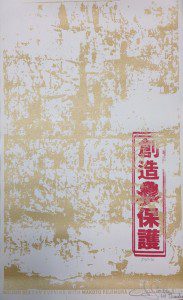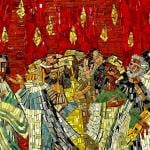 How often do reductionistic assumptions keep us from encountering God in Christ and experiencing robust biblical faith? This question loomed large the other night at the Portland Art Museum during a feature presentation of Makoto Fujimura and his work.
How often do reductionistic assumptions keep us from encountering God in Christ and experiencing robust biblical faith? This question loomed large the other night at the Portland Art Museum during a feature presentation of Makoto Fujimura and his work.
My wife Mariko and I attended the Portland premiere of the short documentary film, The Golden Sea, which chronicles Mako’s story as an artist in the United States and Japan. We soaked in the film and listened intently to Mako’s ensuing interview with Tom Manley, the President of Pacific Northwest College of Art. It was so invigorating to hear Mako speak of art and faith as a follower of Christ in the same breath to a room packed full of people perhaps as inquisitive as he. At the very least, Mako’s reflections led us further away from the path to reductionism in the search for life filled with infinite possibility. My mind exploded with various explorations as a result of listening to the artist speak and viewing the film. His interviewer seemed as captivated as I. Isn’t that what good art should do to one’s soul and imagination?
The artistic genius opens us up to grasping a sense of how the whole of life might be conceived in figurative ways. I believe Immanuel Kant said something to this effect. In their own unique way, the Gospels do as well, as Jesus spoke on numerous occasions that the kingdom of God is like…
The Christian Bible depicts Jesus as God’s revealed mystery. He is enfleshed poetry. Theological inquiry should be like art. For Mako, art is a form of theological inquiry. Theological inquiry should open us up to the infinite possibilities of faith in view of God’s revealed mystery. As Karl Barth would say, God is revealed in hiddenness and hidden in revelation in the person of Jesus. We can never put Jesus under lock and key, even as we come to grips with him. We can never master him—this divine and human subject. Only as Jesus masters us are we free to innovate and experience his infinite mystery.
Mako spoke of how key innovation is. He was not speaking of innovation for innovation sake, but of that form which emerges from the data of one’s subject matter. Also, while investigating such data, he encouraged us to guard against reductionism, a point brought home to him by his father, a noted physicist. Makoto encouraged me in what he said to approach life in an open way: engage the subject matter before you, as it presents itself to you; approach every moment with a sense of wonder—so, too, the subject matter of faith.
I was struck by how the beauty of brushes and pigments moves Mako. His subject matter moves him. Life moves him. There is a very real sense in which he never puts down the brush. He is always observing, always painting, even as he is engaged in conversations with people, whoever they may be.
Mako spoke of the importance of Simone Weil and Emily Dickinson to his life the other night. When he and I talked over lunch at a conference on convicted civility sponsored by the Murdock Trust earlier in the week, he responded to my appreciation of the French Catholic artist Georges Rouault by saying Rouault’s art has had a pivotal influence on his evolution in Christian faith.
Along with the noted Japanese painter Katsushika Hokusai, Rouault is my favorite artist. Mako is fast becoming a favorite of mine as well. Mako speaks of good art keeping us from commodifying people. I believe it also keeps us from commodifying God in view of the seemingly omnipresent pull of reducing all things to the cheapening forces of market value. As in the art of Rouault, who had been trained by a stained glass maker, Mako’s art envisions light breaking through the darkness, as when morning light penetrates colored glass and dances upon ocean water.
In a similar way, faith leads us to believe there is more to life beyond the pale, knowing that even though we look through a glass dimly now, we shall one day see face to face. Such faith, hope and love move us beyond fixation with what the market tells us our value is to what God in Christ will make it be. Good art like good faith never cheapens an uncommon God or the most common of people. Life before God is so deep, rich and refreshing, like a golden sea.
This piece is cross-posted at The Institute for the Theology of Culture: New Wine, New Wineskins and at The Christian Post.













